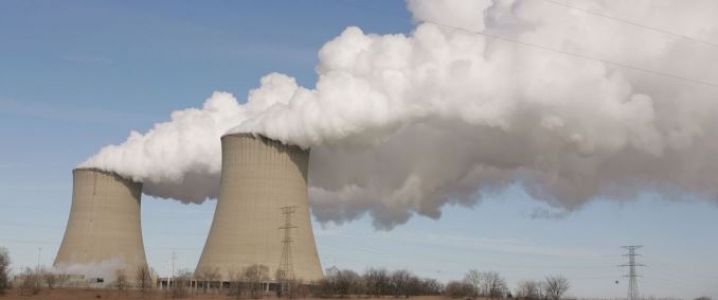Japanese technology giant Hitachi on Thursday Jan 17 announced it was suspending all further work at its Wylfa Newydd nuclear project in Anglesey, north Wales. This decision by Hitachi’s Board of Directors yesterday in Tokyo included writing off the $2.8 billion already invested in site preparation work. The board also decided to cancel a second nuclear project in the UK at Oldbury in Gloucestershire.
This move hardly comes as a surprise. (See our previous Oilprice report “Another Nuclear Megaproject Bites the Dust”, November 19, 2018.)
What makes this announcement noteworthy is the accompanying statement by CEO Toshiaki Higashihara. He articulated three specific criteria or guarantees that would have to be met by UK authorities in order for Hitachi to resume nuclear construction: 1) the project would have to be financed off the corporation’s balance sheet; 2) Hitachi would only commit relatively limited additional capital to the project; and 3) even this modest incremental investment would have to offer the corporation prospects of an adequate profit.
Mr. Higashihara stated that the company made this announcement based on “economic rationality”. When we first read this statement from the CEO, we thought he meant that the plant itself required “economic rationality”, i.e. the purchased power contracts needed to be restruck at higher prices. However we believe the CEOs statement has a different meaning.
Hitachi recently purchased ABB’s power grids division for over $6 billion. We doubt the company has the balance sheet strength to, in addition, complete a $25 billion construction project by itself. And more importantly, management is also stating it has no desire to finance this nuclear construction for a decade or more before a potentially lucrative payment stream becomes available. After the company’s announcement, its share price rose immediately and senior rating agency personnel in Tokyo made positive comments about lessening credit stress. Related: BP Bets Big On The Caspian Sea
This brings us to the heart of the matter—the big reduction in nuclear subsidies. EDF’s nuclear project at Hinkley Point received guaranteed subsidies of £92.50 for every MW hour produced for close to the life of the plant. According to the FT the Wylfa guaranteed power price approached “only” £75 per MW hour with declining rates for additional reactors on site. Greg Clark, UK business secretary, stated in regard to these nuclear subsidies that it was impossible to be more generous to Hitachi given the falling price of renewables. And with that statement he may have sealed the nuclear industry’s fate in the UK.
What we’re seeing here is a subtle shift. Private sector corporations that are nuclear builders are now recognizing that even their relatively large balance sheets are finite. Up until now they may have been willing to fully finance a nuclear construction project in return for a lucrative power purchase contract lasting decades. But no longer. It is likely that the recent Westinghouse bankruptcy, which adversely impacted Tokyo based Toshiba with $9 billion of construction related losses, is still having an impact on decision making.
And there seems to be a shift on the government side on two fronts. First as we already pointed out the power purchase subsidies on offer were about 20% below those offered to EDF for Hinkley Point. And second, Secretary Clark stated that he “was not prepared to ask taxpayers ....(to take) on the majority of construction risk” regarding the Wylfa project. We believe this also reflects some governmental embarrassment over the generous treatment received by EDF/Hinkley and the subsequent considerable negative treatment in the press which highlighted declining renewables prices. Nevertheless we appear to be at an impasse. Both public and private sectors claim they can’t finance this next generation of nuclear new build.
So where does that leave the UK’s planned nuclear construction program which began with six planned stations: Hinkley, Moorside, Wylfa, Oldbury, Bradwell and Sizewell? Hinkley is under way, years late and massively over budget. Wylfa, Oldbury and Moorside are all now cancelled or suspended. Bradwell and Sizewell have not yet received nuclear site approvals from regulatory authorities.
At present, nuclear power constitutes about 20% of the UK’s roughly 85 MWs of installed power generation, renewables are 30% while fossil, mostly gas is 50% of capacity. We believe the government’s plan was simple. Just keep nuclear power generation at its present percentage. But to do so would require about 17,000 megawatts of capacity or about 6 new power stations. The UK’s nuclear fleet is aging rapidly and its newest reactor at Sizewell entered service in the mid 1990s. Related: IEA: OPEC+ Cuts Put Floor Under Oil Prices
This cancellation pretty much dooms the U.K. government’s nuclear new build strategy. We have argued in the past that nuclear power is not and never was a purely commercial proposition. Public policy and finance, rather than simple market economics (given the lack of carbon taxation and provisional waste fuel disposal arrangements), should determine nuclear policy.
The UK is not lacking in options with respect to its future power needs. The UK has the added advantage that power usage declined substantially in the previous decade due to aggressive conservation measures and manufacturing declines.
The Chinese government remains the sole aggressive exporter of nuclear technology. Renewable costs, both onshore and offshore, continue to decline. There is an interconnector to Europe which could be expanded. There are many energy policy options. This is not an end- of- the-world -is-coming situation.
But if the answer is “yes” to new nuclear, acknowledge it has to be a government supported project. Hitachi’s Wylfa cancellation simply underlines the ambiguity of the U.K.’s supposedly supportive policy of encouraging but not explicitly and financially supporting a supposedly much desired nuclear new build effort.
By Leonard Hyman and William Tilles
More Top Reads From Oilprice.com:
- Oil Flat As U.S. Drilling Slows Down
- French Total To Enter Saudi Downstream Business
- Huge Backlog Could Trigger New Wave Of Shale Oil


















